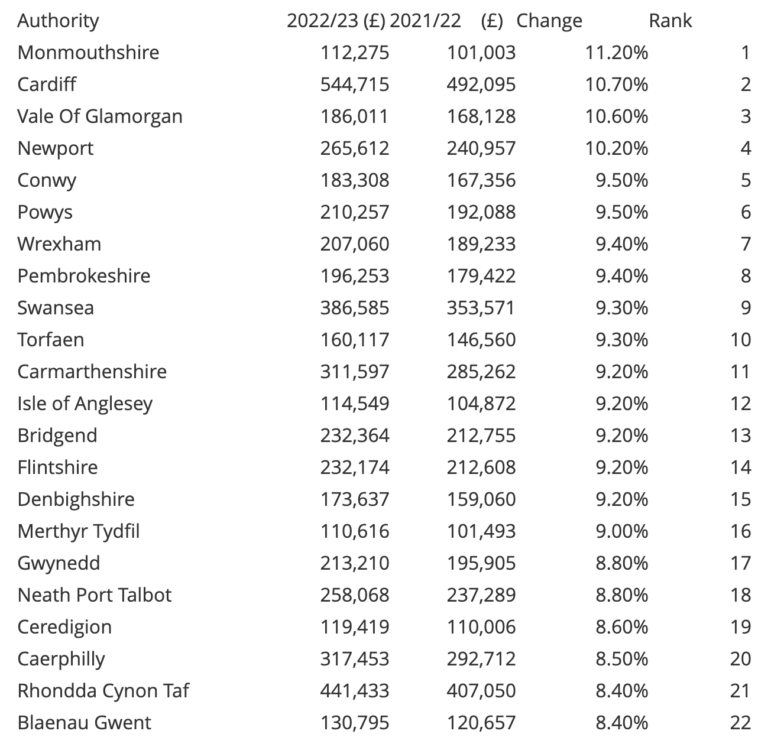Welsh councils are set to receive millions of pounds in extra funding, which should alleviate potential service cuts and council tax rises. This week saw the Welsh Government announce its provisional local government settlement, which will see every Welsh authority receive at least an extra 8.4% for 2022/23.
With the work of county councils having been highlighted during the pandemic, the move also coincides with more burden being placed on town halls across the country, who face paying the real Living Wage for care workers as well as factoring in the new teachers’ pay deal.
Torfaen Council will receive £160,117,000 for 2022/23, an increase of 9.3%
The Welsh Local Government Association, which represents all 22 local authorities, described the proposals as “one of the best financial settlements since the beginning of devolution, recognising the significant challenges which remain for council budgets.”
The settlement – which is the block grant received annually from the Welsh Government – represents the bulk of all council income. But largely due to huge reductions during a decade of austerity, many councils have found themselves cutting some services as well as implementing politically unpopular council tax rises to make up some of the shortfall.
In an announcement, the Minister for Finance and Local Government said that staff pay rises as well as living wage costs for care workers had been factored into the increased settlement.
Rebecca Evans MS went on to confirm that the core revenue funding for local government in 2022-23 will increase by 9.4% on a like-for-like basis compared to the current year, with no authority receiving less than an 8.4% increase.
“As in recent years, our priorities continue to be health and local government services,” she added.
“This significantly increased settlement will enable local authorities to continue to deliver the services their communities want and need as well as supporting national and local ambitions for the future, including responding to the climate and nature emergency and contributing to our Net Zero Wales plan.
“This is a good settlement for local government. It provides local authorities with a stable platform on which to plan their budgets for the coming financial year and beyond.
“We have worked closely with local government and we appreciate the pressures local government is facing. We will continue to protect local government, particularly at this difficult and challenging time.”
Plaid Cymru’s spokesperson for Finance and Local Government, Llŷr Gruffydd MS, welcomed the announcement.
“The last two years has underlined the critical role that our local councils play in so many aspects of our lives,” he said.
“They have gone the extra mile to keep us safe whilst still delivering the core services so many of us depend upon. We hope this provisional settlement will allow that crucial work to continue, whilst also helping to deliver the commitments in the Co-operation Agreement between Plaid Cymru and the Welsh Government, not least the provision of free school meals to all primary school children.”
But the Welsh Conservatives’ Shadow Minister for Local Government, Sam Rowlands MS, said: “Councils have gone above and beyond throughout the pandemic to ensure essential services carried on as normal and it is only right they have been given enough money to continue functioning effectively.
“Whilst we welcome these increases, they come after years and years of underfunding from the Labour government, especially for rural and north Walian councils. Maybe I am a little bit cynical, but Labour have announced a bumper settlement with local government elections just a matter of months away and there are also serious questions over why there is no breakdown of funding for 2023 and beyond.
“What are they hiding? If I had to make a bet, I would say they are planning to cut budgets again after the election year, meaning councils will be forced to axe services and residents could be faced with higher tax bills as a result.
“It is imperative that councils plan ahead with this money and use it for the benefit of residents. Locally elected councillors know what their communities need most, whether that’s keeping any council tax increase as close to 0% as possible or whether it’s providing a great place for businesses to invest and improving stretched services.”
The Welsh Government is set to confirm its final budget in March 2022. The individual budget setting decisions facing all 22 local authorities will be among the final acts of the current lineup of county councillors ahead of May’s local elections.
Funding settlement across Wales
Photo credit
Photo by Alaur Rahman from Pexels

